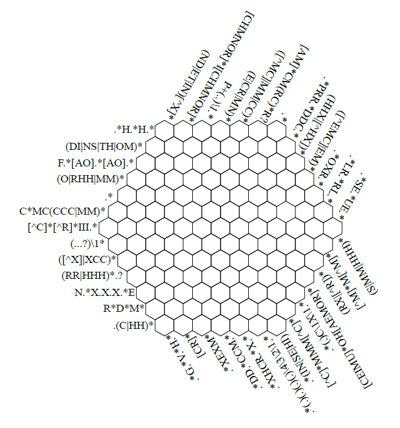Firstly, I would like to announce that today is the Ides of March.
Secondly, I was alerted on two semi-recent occasions to this beast of a puzzle, namely the regular expression crossword. Like a normal crossword, you populate the empty cells of a grid with letters such that the resulting lines agree with the corresponding clues. However, as you can see below, there are a few fundamental differences:

The clues are regular expressions, which constrain the possible strings of letters. For example, the regular expression ‘[CR]*’ uses the Kleene star to enable arbitrary strings to be formed over the alphabet {C,R}. For example, CCRRC, R, CC and the empty string all fit this regular expression, whereas the string RRGCR does not. Other symbols have different properties.
Another disparity between this and conventional crosswords is the underlying lattice. Instead of the square tiling, , the author has chosen to use a hexagonal tiling instead. Consequently, each cell lies on three lines, and the clues point in three directions.
This mention of ‘three directions’ provides a neat segue on to my third and final point. I feel compelled to draw your attention to an excellent music video published yesterday by the Three Directions, entitled ‘That Makes It Invertible’. Skip to 1:10 in the following video to listen to the song:
[youtube=http://www.youtube.com/watch?v=O4KCoNvRi6Y]

Ehud Shapiro once proposed a language for programming systolic arrays, where you annotate Prolog clauses with Logo-turtle directions, meaning “spawn the process that computes this over here”: http://www.jipdec.or.jp/archives/icot/ARCHIVE/Museum/FGCS/FGCS84en-proc/84eANGC3-1.pdf
Are you interested in techniques for making cellular automata more programmable?
That looks very interesting; I’ll read the paper at the next available opporunity.
When I first read this post, I never knew that the regex crossword was a part of a heist to steal a coin from a bank, which in turn was a part of the MIT Mystery Hunt. Anyway, for posterity’s sake: http://web.mit.edu/puzzle/www/2013/coinheist.com/rubik/a_regular_crossword/grid.pdf